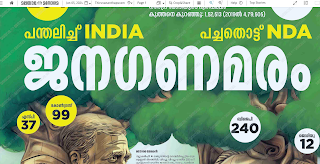There is something called "principles" in journalism, just like those in other prestigious professions. Besides the cardinal principles of Truth, Verification, and Informed Criticism, there is a thing called uncomfortable "questioning" employed by professional journalists to ferret out information and truth, and to counter canards, lies, and misinformation. Flowing with the tide cannot be journalism in the strictest sense of the Fourth Estate, and it is a characteristic more suited to Public Relations (PR) and spin crafted in corridors of power.
Now, cut to another story. A respected court of law found someone guilty in a serial blast case and sentenced him to six years in jail. As per the law, any convict is eligible for 90 days parole in a calendar year. The convict was released on furlough for 14 days on October 1, 2013 and had applied
for an extension of another 14 days, after which he returned to Yerawada
on October 30, before being granted parole in December, says a newspaper report.
The media did not create a hullabaloo over this when compared to the slip-of-the-tongue from a politician, or a unsubstantiated corruption allegation. The media did not create a ruckus until the Bombay High Court today asked what's going on. The court was hearing a Public Interest Litigation (PIL) challenging the constant extensions to the parole granted to the convict.
For the Indian media, there are obvious biases and prejudices. But it is high irresponsibility when certain things that need to be questioned are brushed under the carpet. The India media never questions certain sections of the society as they derive sustenance and the much needed monies from those quarters. While politicians are pilloried, no questions are asked about certain powerful and influential sections of the society.
Besides corruption, this selective blowing up and pushing down of inconvenient truths are the biggest threats to Indian democracy. It is high time the consumers of Indian media recognize this ugly fact.
Subscribe to:
Post Comments (Atom)
Newspaper front pages - June 5
Some images of front pages of newspapers after votes were counted on June 4, 2024 after a ridiculously long parliament elections. Did the ...

-
Some images of front pages of newspapers after votes were counted on June 4, 2024 after a ridiculously long parliament elections. Did the ...
-
The following classification of newspaper headlines is based on my journalism notes. They are from the point of page layout. Flush Left -Hea...
-
Leaders who pick and quibble and snipe are people who fear that a Mojofied team might threaten their own petty power. If your environment is...

No comments:
Post a Comment